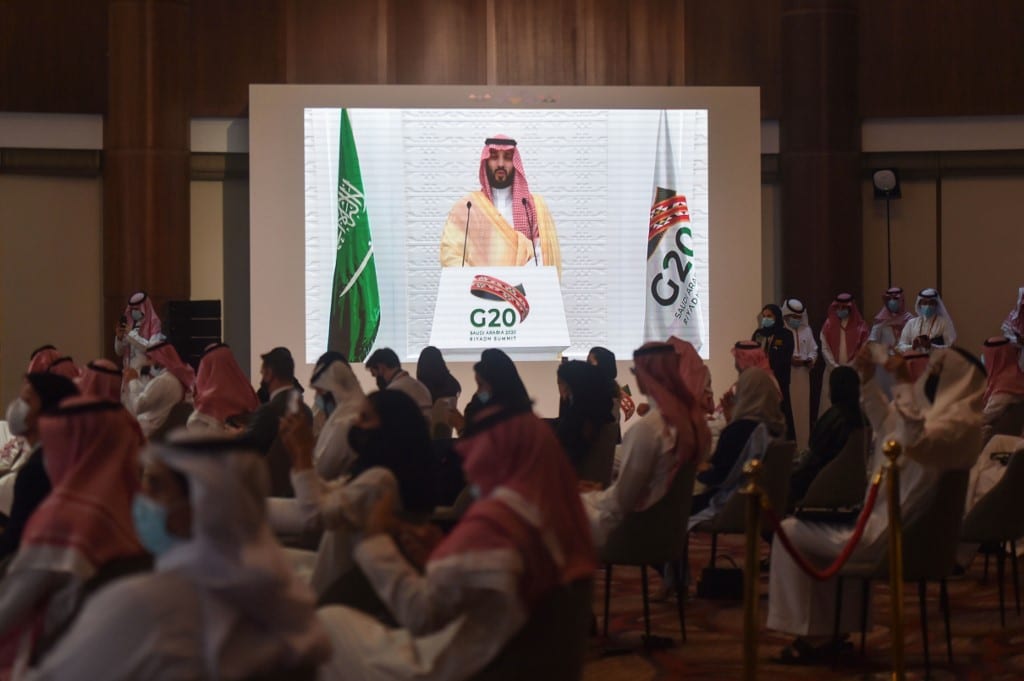
Florence Massena
Riyadh second Summit for the G20, an international forum for the governments and central bank governors from 19 countries and the European Union, gathered online on November 21-22, 2020 “hosted” by Saudi Arabia. It focused on an opportunity of vaccine, while completely ignoring human rights issues facing its virtual host.
After a first virtual G20 meeting in March 2020, where the challenges posed by the coronavirus were discussed, the second in November 2020 focused mainly on the vaccine. Among other topics addressed were the fight against corruption, with the endorsement of various acts and treaties and the invitation for Saudi Arabia to join the OECD (Organization for Economic Co-operation and Development) Working Group on Bribery, the protections of environment and tourism, and empowerment of women globally, specifically in the economical and the political sectors.
This particular point comes by as almost ironical, as Saudi Arabia isn’t the most liberating country for women in the world. In fact, a guardianship system is still in place. It’s a system stating that every woman must have a male guardian who has the authority to make a range of critical decisions on her behalf. According to its 2019 report on Saudi Arabia, the international rights organization Amnesty International wrote that: “The reforms did not allow women to marry without the permission of a guardian or to provide consent for her children to marry. Women and girls continued to face systematic discrimination in law and in practice in other areas such as marriage, divorce, inheritance and the ability to pass on citizenship to their children. Women and girls remained inadequately protected from sexual and other forms of violence. They continued to need a male guardian’s permission to leave shelters for those who had experienced domestic abuse.”
The reforms the organization refers to were made in August 2019 and represent the biggest loosening up of the rules for girls and women so far in the Kingdom. The organization Equality Now lists up the new measures, saying that women are now: “protected from employment discrimination, able to register births and deaths, able to obtain family records, able to make medical decisions about their own body, related to birth and pregnancy, able to travel abroad without being accompanied by a guardian”. All of those advances come a year after Saudi women were given the right to drive in June 2018.
On paper, it could look like Saudi Arabia was ready on modernizing its approach to women’s but also human rights, giving itself a renovated image colliding with the aspirations expressed by Crown Prince Mohammad Bin Salman (MBS) with his Vision 2030. Adam Coogle, deputy director with the Middle East and North Africa division at the international organization Human Rights Watch (HRW), told Fanack to consider these information with carefulness: “Saudi Arabia has removed some of the aspects of the male guardianship system, including allowing women to drive and travel without restriction, and women are being encouraged to obtain higher education and join the workforce. A lot of the reforms are undermined by the fact that the women’s rights activists who pushed for them are either in jail, in exile, or silenced.”

Most of Saudi leader women’s rights activists have been imprisoned or exiled during the two last years, during which the Kingdom intensified its crackdown on them. For example, Eman al-Nafjan was arrested in May 2018 along with Loujain al-Hathloul, Aziza al-Yousef, Aisha al-Mana, and Madeha al-Ajroush, all women’s rights activists. She has been released a year later and is now banned from leaving the country. We can name other human and women’s rights activists, such as Samar Badawi, Nassima al-Sadah and Nouf Abdelaziz who have been in jail since 2018, while Shadan al-Anezi, Hatoon al-Fassi and Amal al-Harbi have been granted temporary release in May 2019.
Furthermore, Saudi Arabia even decided to play on the possible future for the activists still in jail ahead of the G20 summit. In an article published by The Guardian on November 10, claims that it considered clemency for jailed female activists were reported. Those claims didn’t materialize into facts since then. According to senior researcher at HRW Rothna Begum, in reaction of that article: “The ambassador falsely told the Guardian hat Saudi courts had found the women guilty of more than advocating the right to drive. In fact, none of the women have been convicted and their sham trials have been indefinitely suspended since mid-2019. Clemency or a pardon would suggest that the women are guilty of a crime but, in reality the authorities just need to unconditionally release them and drop the abusive charges. Human Rights Watch is calling on governments around the world to call for the unconditional release of these women and other detained human rights defenders in Saudi Arabia”.
HRW and other rights organizations continuously asked for world leaders to agree on sanctions towards Saudi Arabia in order for the situation to change, without any result yet. In fact, Coogle told Fanack that: “G20 countries awarded Saudi Arabia the G20 presidency for 2020, despite the Saudi government’s unrelenting assault on fundamental freedoms, including jailing and harassing public dissidents and human rights activists, unlawful attacks on civilians in Yemen, and flouting international calls for accountability for the murder by state agents of the Saudi journalist Jamal Khashoggi. After the G20 ended, Saudi authorities wasted no time restarting the trials of women’s rights activists that had been on hold for more than a year.” As a matter of fact, Loujain al-Hathoul’s trial has been transferred to the Specialized Criminal Court in Riyadh on November 25 2020, and Nassima al-Sadah was convicted and sentenced to five years in prison with two years suspended on the same day.
The Kingdom seems to be able to continue its way free of criticism and actual action from the international community, shutting up any voice it considers opposite to its interests and values. Saudi Arabia even gains international attention, but not scrutiny, by virtually hosting the G20, various sports events and, even more recently, having allegedly met with Israeli Prime Minister Benjamin Netanyahu. An attention that is still not likely to make the Kingdom be held accountable for its continuous human rights abuses.
DISCLAIMER
The opinions expressed in this publication are those of the writer(s). They do not purport to reflect the opinions or views of Fanack or its Board of Editors.


